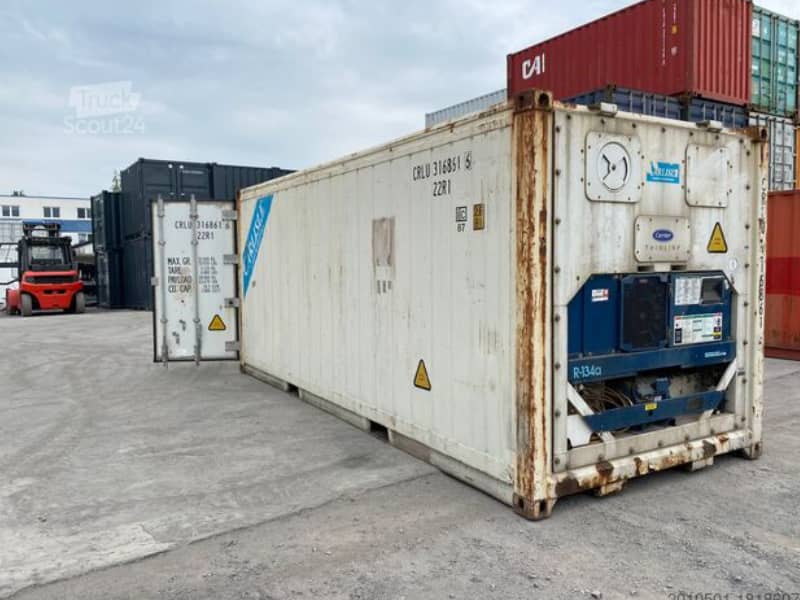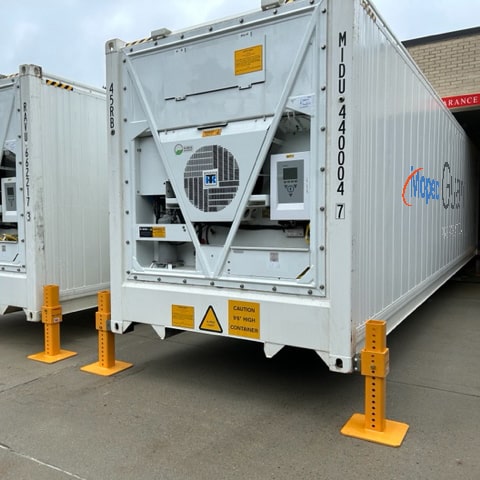Everything About Cold Storage Containers: Necessary Insights for Your Storage Space Needs
Cold storage containers play a vital role in the preservation of subject to spoiling products. They are available in various types, consisting of cooled and insulated systems, each designed for specific storage space needs. Recognizing the benefits and vital attributes of these containers is vital for companies intending to maximize their procedures. As the demand for reliable storage space services expands, checking out the various choices readily available can result in informed choices that impact both earnings and sustainability. What variables should one think about when selecting the ideal container?
Sorts Of Cold Storage Space Containers
Cold storage containers come in different types, each created to meet certain temperature level control demands. Amongst the most common types are refrigerated containers, which maintain temperatures between 0 ° C to 10 ° C, making them appropriate for disposable products like fruits, veggies, and milk items. An additional kind is the deep freezer container, which runs at temperatures below -18 ° C, perfect for lasting storage space of icy things such as meats and fish and shellfish.
Shielded containers supply temperature stability without active cooling, making them useful for temporary transportation of temperature-sensitive items. Additionally, there are mobile cool storage units, which provide flexibility in places and are often utilized in occasions or seasonal operations. Finally, blast chillers swiftly lower the temperature level of hot foods, making certain safety and security and top quality. Each type serves an unique objective in various sectors, from food solution to drugs, highlighting the value of picking the best container for specific storage requirements.

Benefits of Making Use Of Freezer Solutions

Moreover, freezer solutions expand the rack life of items, reducing waste and raising earnings for businesses. By efficiently taking care of stock with correct temperature control, companies can maximize their supply chains and enhance functional performance.
In addition, chilly storage centers permit adaptable storage alternatives, accommodating different quantity needs and seasonal changes sought after (used 40ft refrigerated shipping containers). This adaptability helps services react rapidly to market adjustments
Using chilly storage space solutions can guarantee compliance with health and wellness and safety and security regulations, protecting both consumers and organizations. Generally, the critical use freezer enhances product administration while advertising sustainability and economic practicality.
Trick Functions to Seek in Cold Storage Space Containers
When choosing cold store containers, numerous vital attributes advantage careful consideration to secure peak performance and reliability. Initially, temperature level control capacities are necessary; containers need to preserve regular temperature levels appropriate for certain products. Insulation quality additionally plays a significant role, as superior insulation decreases power usage and improves temperature stability.
Next off, convenience of gain access to and loading is essential; containers should offer straightforward styles for reliable handling and company. Durability is an additional crucial aspect; weather-resistant products ensure long life and safeguard materials against ecological variables.
Furthermore, mobility attributes, such as built-in wheels or lifting points, assist in transport, while personalized designs allow for customized storage solutions.
Last but not least, keeping an eye on systems, including temperature level alarms and remote monitoring, offer real-time updates, making sure that conditions continue to be excellent. By focusing on these functions, users can choose freezer containers that satisfy their functional needs efficiently.
Picking the Right Cold Storage Container for Your Needs
Selecting the appropriate cold store container requires a thoughtful evaluation of functional requirements and particular requirements. Factors such as the type of products being kept, temperature level sensitivity, and volume must be focused on. Subject to spoiling food items may necessitate containers with strict temperature controls, while pharmaceuticals may need exact problems to preserve efficacy.
Furthermore, potential individuals must think about the container's dimension and movement. A bigger device might be essential for mass storage space, while smaller sized, mobile alternatives can be ideal for momentary or on-site demands. Insulation high quality and energy effectiveness are additionally crucial, as these will impact functional prices and temperature level security.
Compliance with industry regulations and standards is essential, specifically in markets like food and health care. By carefully assessing these aspects, customers can choose a chilly storage container that successfully meets their unique needs and assurances optimum storage space problems.
Best Practices for Keeping Cold Store Conditions
Preserving optimal cold storage space conditions is crucial for preserving the top quality and security of temperature-sensitive products. Consistently keeping an eye on temperature and moisture levels is critical; utilizing dependable digital thermostats and hygrometers can supply accurate analyses. Correct insulation of cool storage space containers helps lessen temperature changes and power loss.
Carrying out a first-in, first-out (FIFO) system assures that older inventory is used prior to more recent supply, decreasing waste (used 40ft refrigerated shipping containers). In addition, maintaining an organized design within the storage space enables for much better air movement and decreases the danger of cross-contamination
Regular upkeep examine equipment, such as seals and compressors, are very important to stop breakdowns. Team training on ideal practices for packing and dumping items aids keep temperature level integrity. click here for info Ultimately, keeping doors shut pop over to this site as much as possible limits warm exchange, ensuring that the cold store setting remains stable and efficient in protecting beneficial items.
Price Factors To Consider for Cold Store Solutions
When reviewing freezer options, it is important to think about the first financial investment expenses alongside ongoing functional expenditures. A comprehensive failure of these prices can disclose considerable long-lasting savings potential for organizations. Comprehending these financial aspects aids stakeholders make notified decisions concerning their cold storage demands.

Preliminary Investment Expenses
The monetary landscape of chilly storage containers presents various initial financial investment prices that organizations must consider. These costs generally include the purchase or rental cost of the containers, which can differ based on insulation, dimension, and kind top quality. In addition, expenditures connected to retrofitting existing frameworks to suit cold store must be factored in, especially if specialized devices is needed. Installment expenses, consisting of electrical job and refrigeration systems, also add to the overall first investment. Services need to not ignore transportation prices for providing containers to their preferred location. Potential customization choices, such as shelving or temperature level tracking systems, can better influence the first economic investment. Careful budgeting for these variables is essential for successful cold store implementation.
Operational Expenses Malfunction
Operational expenditures for freezer services incorporate numerous crucial cost factors to consider that companies should browse. Key factors consist of energy costs, which can be substantial as a result of the requirement to maintain low temperature levels. Maintenance expenses are additionally significant, as normal maintenance is important to assure devices runs effectively and remains compliant with health and wellness requirements. In addition, labor costs may arise from the demand for specialized from this source team to keep track of the storage space and handle setting. Insurance expenditures are an additional consideration, as companies need to protect their investments against potential losses. Ultimately, any kind of possible regulative conformity expenses should be factored in, as companies may require to spend in systems that abide by food safety and security and ecological policies. Recognizing these costs is important for efficient budgeting.
Long-Term Financial Savings Possible
Purchasing cold storage options provides substantial long-lasting savings potential, changing preliminary expenses into financial efficiency with time. By reducing wasting and waste, companies can boost their profit margins substantially. Advanced insulation and energy-efficient systems reduce utility costs, which build up over the life expectancy of the equipment. Additionally, cool storage containers typically call for much less regular maintenance compared to conventional refrigeration methods, causing reduced repair costs. The capability to shop items for extended periods without endangering top quality permits companies to maximize market variations, maximizing income. Furthermore, the scalability of cool storage space solutions makes it possible for companies to adapt to altering needs without sustaining excessive costs. Generally, these elements add to an engaging case for freezer as a cost-efficient financial investment technique.
Often Asked Concerns
Just How Lengthy Can Food Be Stored in Cold Store Containers?
The duration food can be saved in freezer containers differs by type. Normally, perishable items last from days to weeks, while frozen foods can stay secure for months, depending on proper temperature level and storage problems.
Are Cold Storage Space Containers Energy-saving?
The energy performance of cold store containers differs based on design and insulation high quality. Modern devices commonly use innovative modern technology to lessen power intake, ultimately adding to minimized functional expenses and environmental effect in long-lasting use.
Can Cold Storage Space Containers Be Custom-made for Certain Needs?
Freezer containers can indeed be customized to meet certain requirements. Alterations may consist of temperature controls, dimension adjustments, and extra attributes, permitting individuals to customize services properly for various storage needs and operational choices.
What Are the Common Dimensions of Cold Storage Containers?
Cold store containers typically come in common sizes such as 10, 20, and 40 feet. These measurements fit numerous storage demands, making certain versatility for organizations needing temperature-controlled settings for delicate materials or perishable goods.
Do Freezer Containers Require Unique Permits for Use?
Cold store containers often need special licenses for usage, depending upon local regulations and meant applications. Authorities may mandate licenses to assure safety standards, environmental conformity, and correct functional practices are kept throughout their use.
Cold storage containers come in different types, each developed to fulfill details temperature control needs. In addition, cool storage space centers enable for flexible storage alternatives, fitting numerous quantity requirements and seasonal fluctuations in need. Selecting the ideal chilly storage space container requires a thoughtful assessment of details requirements and functional requirements. The financial landscape of chilly storage space containers offers different first investment costs that companies must consider. Cold storage space containers can indeed be tailored to meet certain requirements.